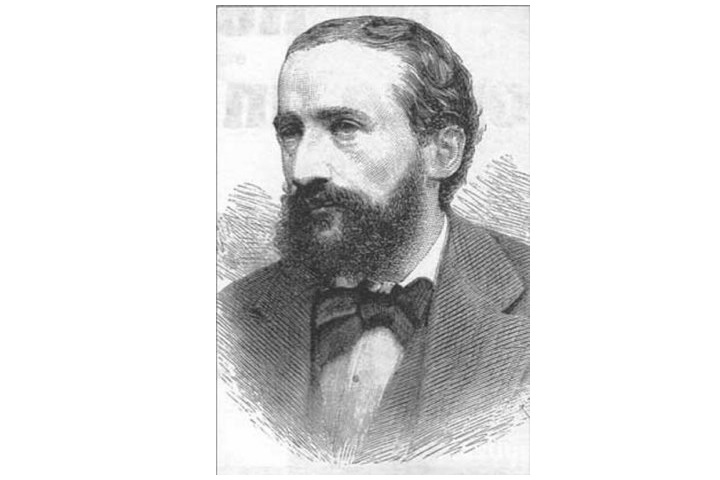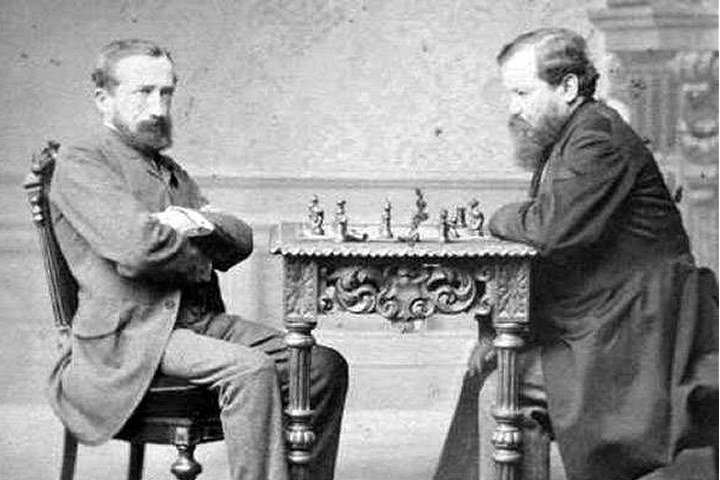


The Tournament and its Participants
London 1883 boasted a powerful field that included Wilhelm Steinitz, Johannes Zukertort, Joseph Henry Blackburne, Mikhail Chigorin, George Henry Mackenzie, Berthold Englisch, James Mason, Samuel Rosenthal, Syzmon Winawer and Henry Bird. Steinitz and Zukertort were the favorites, as they had been the most dominant players of the last decade, winning the strongest tournaments and high-stakes, private matches.
The others were seasoned masters. "The Black Death" Blackburne and Bird were the cream of English chess. Mason and Mackenzie were the leading American players who had won the last four American championships, Mackenzie in 1871, 1874, and 1880, and Mason in 1876. Mackenzie, in particular, seemed to toy with the competition, taking first place in every tournament he entered on US soil. A player of his caliber was always meant to cross swords with the outstanding masters of Europe.
Chigorin was only taking his first few steps into international play, but late in the decade he would develop into the powerful player who would contend for the world championships in 1889 and 1892. Englisch, of Austria, was a strong master in top form, having won two recent international tournaments, Leipzig 1879 and Weisbaden 1880. The Polish-born Rosenthal was the pride of France, its strongest player since the mid-1860s, notwithstanding that he had always been more active as a chess journalist and theoretician than as a competitive player. He was champion of Café de la Regeance from 1865 to 1867, and national champion of France in 1880. Winawer of Poland was an elite player, and just the previous year he had tied Steinitz for first in the great Vienna 1882, the strongest tournament in history up to that point in time.
The event was a double round-robin, with draws needing to be replayed until a decisive result was achieved, or until the third game where any result counted. Four less-accomplished players in Josef Noa, Alexander Sellman, James Mortimer, and Arthur Skipworth completed the field, bringing the total number of participants to fourteen. With each player having to play thirteen opponents twice, twenty-six rounds were slated, not counting the replay for every drawn game. London 1883, therefore, was a test not only of skill but also of stamina among the world’s best players.
Chess fans expected an open and close race, but Zukertort dashed all the thrill out of it by racking up one victory after another. He won the event after only twenty-three rounds, as he had already built an insurmountable lead at 22 points (22 wins against only 1 loss). He lost his last three games out of sheer exhaustion.
Zukertort drew only four of his two-game matches with one win and one loss, one of which was against Steinitz, but he swept all the others, 2-0. This included sweeps of Blackburne, Chigorin, Englisch, Mason, Rosenthal, Winawer, and Bird.
Steinitz came a distant second at 19 points. He scored one less 2-0 win than Zukertort, and suffered shut-out losses himself to Chigorin and Rosenthal, which made the difference. The gap between Steinitz and the third-placer, Blackburne, however, was almost as huge as that between him and Zukertort. The rest of the masters huddled closely in the middle, with Bird, in tenth, ten points behind Zukertort.
Steinitz and Zukertort came to London 1883 as the leading players, and the results revealed that, indeed, they were quite in a class of their own.
| Rg. | Name | 1 | 2 | 3 | 4 | 5 | 6 | 7 | 8 | 9 | 10 | 11 | 12 | 13 | 14 | Pts. |
| 1 | Johannes Hermann Zukertort | 10 | 11 | 11 | 01 | 11 | 11 | 11 | 11 | 11 | 11 | 01 | 11 | 10 | 22.0 / 26 | |
| 2 | William Steinitz | 01 | 01 | 00 | 11 | 10 | 11 | 00 | 11 | 11 | 11 | 11 | 11 | 11 | 19.0 / 26 | |
| 3 | Joseph Henry Blackburne | 00 | 10 | 10 | 00 | 01 | 11 | 1 * | 1½ | 10 | 11 | 11 | 11 | 11 | 16.5 / 26 | |
| 4 | Mikhail Ivanovich Chigorin | 00 | 11 | 01 | 11 | 01 | 01 | 10 | 01 | 10 | 01 | 11 | 11 | 10 | 16.0 / 26 | |
| 5 | George Henry MacKenzie | 10 | 00 | 11 | 00 | ½½ | 01 | 10 | 10 | 01 | 11 | ½1 | 11 | 11 | 15.5 / 26 | |
| 6 | Berthold Englisch | 00 | 01 | 10 | 10 | ½½ | 00 | 1½ | 10 | 01 | 11 | 11 | 11 | 11 | 15.5 / 26 | |
| 7 | James Mason | 00 | 00 | 00 | 10 | 10 | 11 | 10 | 10 | 11 | ½1 | 11 | 11 | 11 | 15.5 / 26 | |
| 8 | Samuel Rosenthal | 00 | 11 | 0* | 01 | 01 | 0½ | 01 | ½1 | 10 | 01 | 10 | 11 | 11 | 14.0 / 26 | |
| 9 | Szymon Winawer | 00 | 00 | 0½ | 10 | 01 | 01 | 01 | ½0 | 01 | 10 | 11 | 11 | 11 | 13.0 / 26 | |
| 10 | Henry Edward Bird | 00 | 00 | 01 | 01 | 10 | 10 | 00 | 01 | 10 | 00 | 11 | 11 | 11 | 12.0 / 26 | |
| 11 | Josef Noa | 00 | 00 | 00 | 10 | 00 | 00 | ½0 | 10 | 01 | 11 | 10 | 10 | 11 | 9.5 / 26 | |
| 12 | Alexander Sellman | 10 | 00 | 00 | 00 | ½0 | 00 | 00 | 01 | 00 | 00 | 01 | 01 | 11 | 6.5 / 26 | |
| 13 | Arthur Bolland Skipworth | 00 | 00 | 00 | 00 | 00 | 00 | 00 | 00 | 00 | 00 | 01 | 10 | 01 | 3.0 / 26 | |
| 14 | James Mortimer | 01 | 00 | 00 | 01 | 00 | 00 | 00 | 00 | 00 | 00 | 00 | 00 | 10 | 3.0 / 26 |
Significance of the Tournament and its Results
London 1883 happened when chess had progressed much since the first international tournament in the same city in 1851. The game had been understood more deeply, and players had become stronger. Ten years before, Steinitz began sharing his new playing principles as a columnist of the British sports magazine, The Field, and unveiled a new, positional playing style in the great Vienna 1873, which he won. The world was slowly assimilating his classical principles, and the Romantic era would soon draw to a close.
Along with this general enlightenment came the need for uniformity in all competitions and rigid processes for determining the world’s best player. Up to that point, settling this issue was left to a player’s reputation and public consensus. A story goes that at the tournament’s prize ceremony, a toast was given to the world’s best player, and Steinitz and Zukertort both rose to accept the accolade. It’s a tall tale, perhaps, but it goes to show that the honor was all a matter of opinion and pride for the two great players.
Paul Morphy was the first to be given such public acknowledgment, a "people’s champion" of the olden times, but upon his retirement, this was passed to Adolf Anderssen by virtue of his victories in London in 1851 and 1862. Steinitz defeated Anderssen in a privately arranged match in 1866, 8-6, and many saw this as a passing of the mantle to Steinitz.
Steinitz would affirm his standing by winning similar matches against his contemporaries. He beat Bird shortly after defeating Anderssen, 7-5, and Blackburne in 1876, 7-0. For good measure, he also won Vienna’s two strong tournaments in 1873 and 1882. If the title of world champion were to be formalized through a confrontation between the world’s top two players, then Steinitz already had one foot in the championship. There only remained the question of selecting a deserving opponent.
That man happened to be Johannes Zukertort, as London 1883 made very clear. In many ways, however, Zukertort’s smashing victory served only as the final affirmation of his worthiness for the world championship, as though it were merely the last of the many feathers in his cap. He won Cologne 1877 and Paris 1878, which had many believing then that he was already the world’s best player. In match play, he had also beaten Anderssen in 1871, and Blackburne in 1881.
Steinitz and Zukertort so outdistanced the field in London 1883 that a match between them to settle the matter of the world’s best player, once and for all, became very immediate. Almost three years later, on January 11, 1886, in New York, and after prolonged negotiations over the match’s regulations and financial terms, both men sat across the board to play the first game of the very first world championship. Steinitz would win the match to become chess’ first official world champion.

Zukertort (left) against Steinitz (right), 1886 World Chess Championship
Selection of world title challengers, thereafter, were made on the same basis. Every worthy contender had to demonstrate his strength consistently, which very often meant that he had to have tournament performances as remarkable as Zukertort’s in London 1883. The practice continued well into the next century and produced four other world champions in Emanuel Lasker, Jose Raul Capablanca, Alexander Alekhine, and Max Euwe. Only in 1948 did the Federation Internationale des Echecs (FIDE) assume the responsibility of organizing the world championships.
It is also noteworthy that London 1883 made the first use of the double-faced, tumbling mechanical clock designed by Thomas Bright Wilson of Manchester, England. Before that, only sand glasses and separate clocks for the players were utilized. This should be one more reason to remember London 1883.

A double-faced, tumbling mechanical clock that was first used in London 1883. | Photo source: www.chesssdragon.com
In all, London 1883 established Zukertort and Steinitz as the world’s strongest players. This led to the match that was arranged, and that the world verily believed, to be the first ever world championship. After Steinitz established himself as the game’s first world champion, the rest became history.
Games
Zukertort vs. Blackburne, Round 6 – Zukertort’s immortal game showcasing a brilliant attack and two astounding deflecting sacrifices.
Chigorin vs. Zukertort, Round 1 – A clash of greats in the first round. Zukertort conducts another strong attack and hunts Chigorin’s King down.
Steinitz vs. Rosenthal, Round 22 – A replay of a drawn game that won for Rosenthal a brilliancy prize.
Winawer vs. Englisch,, Round 6 – Winawer forces a breakthrough in a seemingly closed position and delivers a fancy, mating attack.
Englisch vs. Mason, Round 10 – A game that thoroughly feels modern. Mason exploits finely the superiority of his Knight over the opponent’s Bishop.
| Advertising |